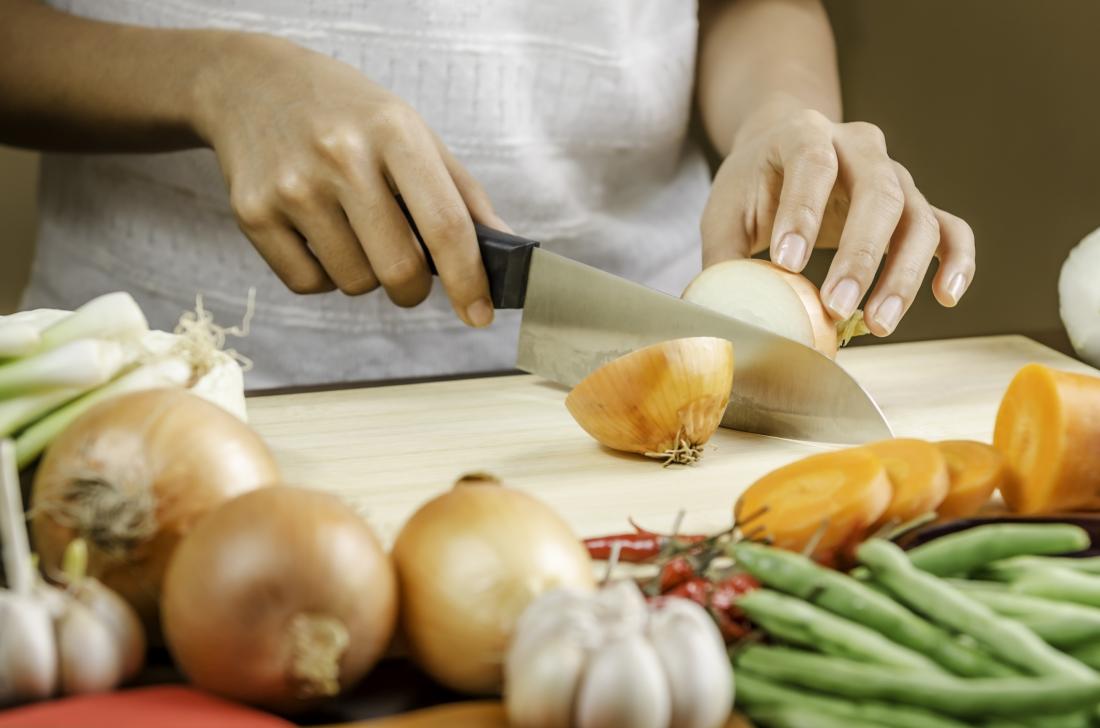
Eating more onions and garlic could keep breast cancer at bay.
Onions and garlic are part of the allium genus, along with leeks, chives, and hundreds of other species.
Rich in flavor, with a strong, pungent kick, these “feisty” vegetables may also be able to fight off diseases, such as diabetes, heart disease, and cancer, according to emerging evidence.
In regards to cancer, several studies have specifically explored the links between onion and garlic consumption and the risk of colorectal, stomach, and prostate cancers.
Overall, these studies have found that the more of these vegetables that people consume, the lower their risk of developing these cancers.
However, less extensive research has gone into the link with breast cancer, say researchers led by Gauri Desai, a doctoral candidate in epidemiology at the University at Buffalo (UB), part of The State University of New York.
So, Desai and the team set out to investigate this topic further, looking at a population of women in Puerto Rico. The reasons for choosing this population were twofold. Firstly, “Puerto Rico has lower breast cancer rates, compared to the mainland [United States], which makes it an important population to study,” explains Desai.
Secondly, a condiment called “sofrito,” which consists largely of garlic and onion, is a traditional Puerto Rican sauce that is widely consumed across the island.
The researchers published the results of their findings in the journal Nutrition and Cancer.
Studying onions, garlic, and cancer risk
Desai and the team used hospital and clinic records to identify 314 women aged between 30 and 79 who had breast cancer between 2008 and 2014. The researchers also included 346 control participants who were matched based on age and residential area.
The control participants had no history of cancer, apart from nonmelanoma skin cancer. The researchers used a food frequency questionnaire to enquire about dietary patterns and total onion and garlic intake, which included sofrito consumption.
The team employed unconditional logistic regression to examine the association between onion and garlic intake and breast cancer occurrence, adjusting for factors such as age, education, family history, body mass index, smoking status, and others.
Sofrito linked to 67% lower breast cancer risk
The researchers found an inverse association between moderate and high total onion and garlic consumption and breast cancer cases, compared with low consumption of these vegetables.
Their findings were consistent after the researchers had stratified the results according to menopausal status, suggesting that “High onion and garlic consumption is protective against breast cancer in [the studied] population.”
Specifically, the authors write, “Sofrito intake, when examined alone, was inversely associated with breast cancer; for those consuming sofrito more than once/day, there was a 67% decrease in risk, compared to never consumers.”
“We found that among Puerto Rican women, the combined intake of onion and garlic, as well as sofrito, was associated with a reduced risk of breast cancer.”
Gauri Desai
“Studying Puerto Rican women who consume a lot of onions and garlic as sofrito was unique,” Desai adds, referring to one strength of the research.
Why might onions, garlic lower cancer risk?
Study co-author Jo Freudenheim, Ph.D., chair of epidemiology and environmental health at UB, also comments on the uniqueness of the study, saying, “There is very little research on breast cancer in Puerto Rico.”
“This study was a collaboration between my colleagues here at UB and at the University of Puerto Rico to help us understand why rates there are lower than in the rest of the U.S., and why rates there are continuing to increase, while they are decreasing in the rest of the [U.S.].”
Although the study was observational and cannot explain the mechanisms behind the findings, the researchers suspect that the flavonols and organosulfur compounds abundant in onions and garlic may be responsible for the anticancer effects.
In particular, the S-allylcysteine, diallyl disulfide, and diallyl sulfide in garlic and the alk(en)yl cysteine sulphoxides in onions have shown “anticarcinogenic properties in humans, as well as in experimental animal studies,” says Dr. Lina Mu, an associate professor of epidemiology and environmental health at UB and the study’s senior author.
Some study limitations
However, the authors also recognize some limitations to their research. For instance, they write, “The size of the study was small, particularly for analyses stratified on menopausal status.”
Secondly, the number of people who had never consumed garlic or onion was too small to use as a reference group. Therefore, the low exposure group still consumed some onion and garlic.
For this reason, say the researchers, the results “may have underestimated the true association between garlic and onion intake and breast cancer.”
“Furthermore, there is not a standardized recipe for sofrito, a condiment which is frequently homemade and therefore varies at least somewhat in recipe from person to person,” add the authors. “Hence, we were also not able to estimate the amount of onion and garlic in sofrito.”
“Although the recipe for sofrito varies to some extent, other ingredients, such as bell peppers, tomatoes, cilantro, and black pepper are usually added. Since we did not adjust our models for these ingredients, we cannot be sure that our results were due to the sole effect of onions and garlic.”
